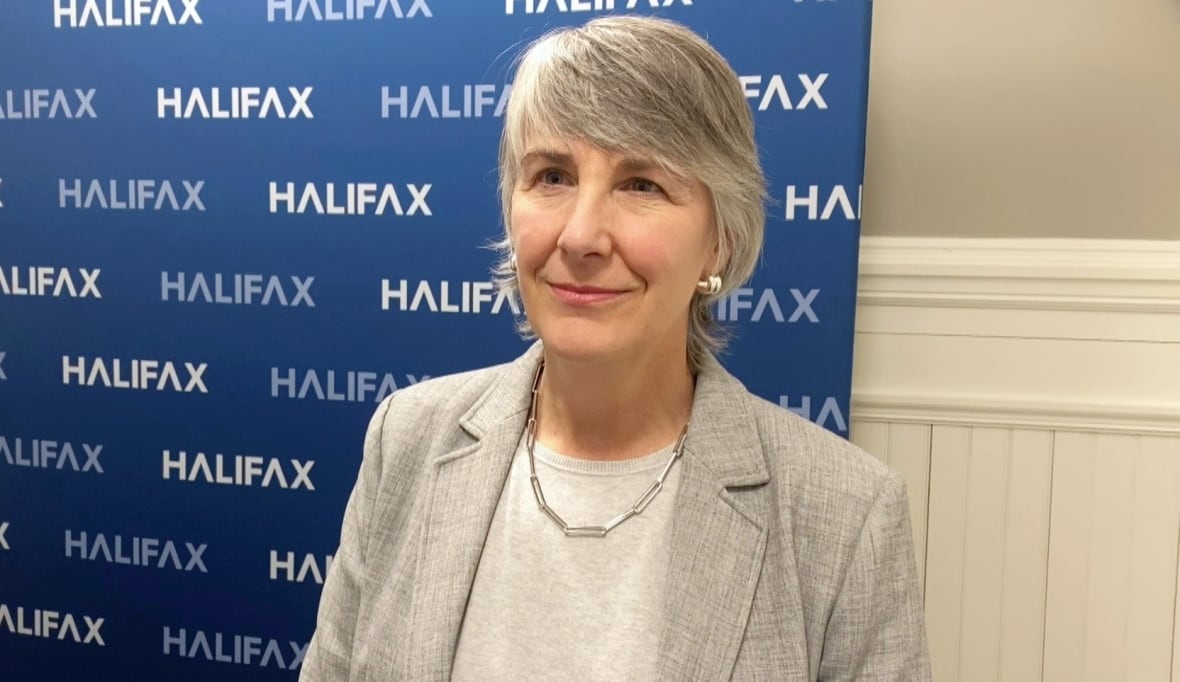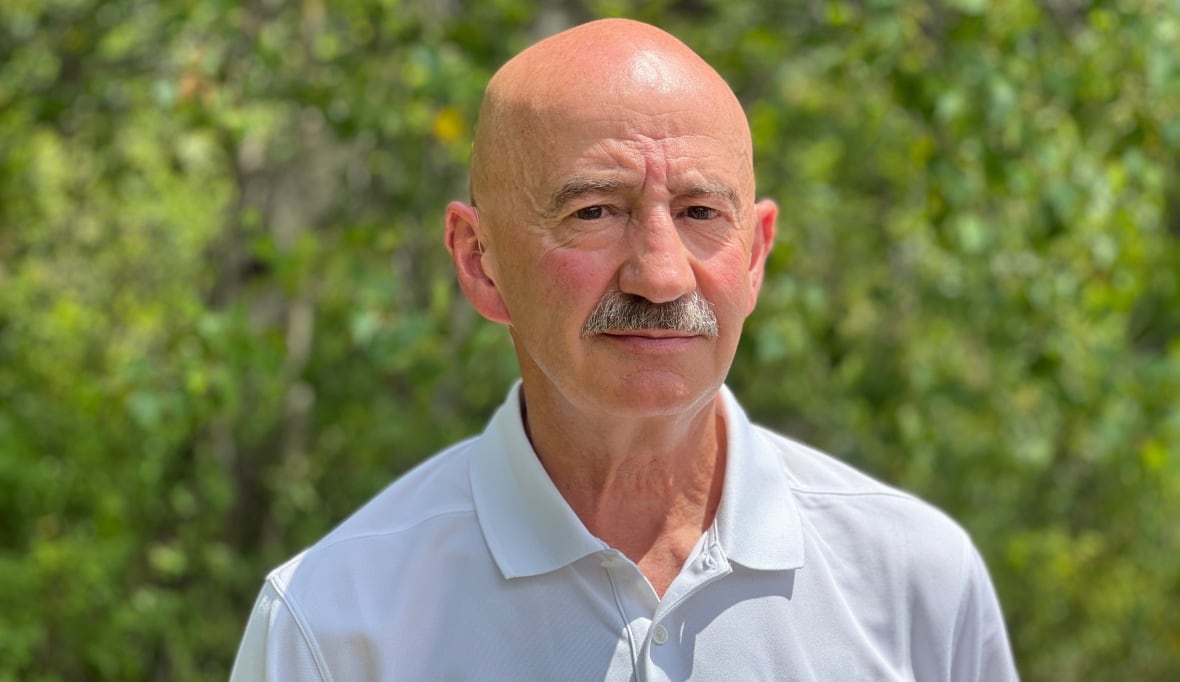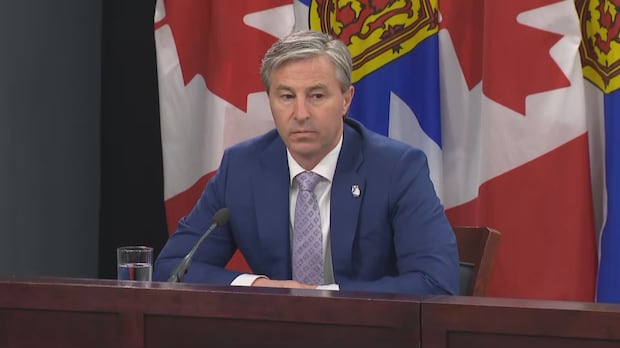Councillors, advocates say premier's plan to block Halifax bike lane about strong mayor powers
Premier Tim Houston says making Morris Street one-way creates economic impacts, safety issues
Citing safety concerns, Premier Tim Houston says his government will overturn Halifax council's decision on a local bike lane, but some councillors and advocates say the move is likely about setting the stage for strong mayor powers.
On Wednesday evening, Houston posted a letter to social media addressed to Halifax Mayor Andy Fillmore, regional councillors and chief administrative officer Cathie O'Toole.
Houston said he had great concerns about council's vote last Tuesday to move ahead with a bike lane design for Morris Street that would eliminate a vehicle lane and make the stretch one-way for car traffic.
The premier wrote that the move will "contribute to traffic congestion, create unnecessary public safety risks and potentially jeopardize port activity."
"To say that I find it disappointing that public safety and economic impact concerns have been dismissed with a simple shrug of the shoulders would be a serious understatement," Houston wrote.
Houston said he remains hopeful that "common sense will prevail," and asked council to reverse their decision by Aug. 6. Council's next regular meeting is scheduled for Aug. 5

If that does not happen, Houston said "the provincial government will be forced to act" and use Bill 24 for the first time. The bill was passed this spring and allows the public works minister to override decisions by municipal councils related to transportation.
Coun. Kathryn Morse said while Houston's letter was disappointing, she thinks it's not really about one bike lane in Halifax.
"I think it's more [of] an excuse to go after council and to strengthen a position for strong mayor powers," Morse said Thursday.
"I'd like to see the premier stay in his lane — and it's not a bike lane."
Houston has said he is open to giving the Halifax mayor powers to make decisions without a majority of council and veto some bylaws.

Halifax council debated the Morris Street design for more than an hour and a half last Tuesday, and asked municipal transportation planning staff multiple questions.
Many councillors said the chosen design of a two-way bike lane on Morris was the best option for cyclists in an east-west connection across the peninsula that kept most of the parking spaces and mature trees intact.
Mayor Andy Fillmore voted against changing Morris Street to one-way, but was overruled by a majority vote.
Deputy Mayor Tony Mancini said if Houston is truly concerned about traffic and safety issues, it would be more effective to sit down for a conversation together as governments, rather than argue in public.
"The biggest issue is that we've added 20,000 people each year over the last number of years, and many of them have cars. And we've grown so quickly, we're behind on our infrastructure," Mancini said Thursday.
"Mr. Premier, if you want to help and to deal with it, great. Let's sit down, help us with transit … bring it to the level that [it] needs to be brought to. It's not there now."

In a statement Thursday, Fillmore said it's not surprising to see Houston's letter because the premier has been clear this could be an option "if municipal actions are inconsistent with broader goals of economic growth, easing congestion and enhancing public safety."
"I will listen, learn and collaborate to achieve our shared objectives as I believe strong leadership hears all voices and engages key partners to deliver the best outcomes," Fillmore said.
Houston said serious attention should be paid to a letter from Emergency Medical Care Inc. (EMCI), also dated Wednesday.
EMCI, which operates the provincial government's Emergency Health Services division, including ground ambulance and air medical transport operations, sent the letter to Fillmore, Houston and other councillors and the provincial health minister.
Ambulance service warns of potential delays
"Our first responders on and around the peninsula are facing increasing challenges due to increasing traffic congestion and call volume. This directly impacts on our ability to efficiently provide pre-hospital care, particularly in time-sensitive situations where every minute counts," wrote Matthew Crossman, chief operating officer for EMCI.
Crossman said turning Morris into a one-way street could have "unintended consequences" for emergency health services. Emergency vehicles may need to be rerouted, leading to delays in reaching the scene of an accident or a hospital.
Since January, Crossman said about 22,000 calls have occurred in the area with most vehicles using Morris Street. However, the "full scope of traffic impact," especially during peak hours, remains unclear without further study by the municipality, he said.
A municipal traffic analysis has found the change would increase congestion and delay at two intersections without stoplights at Barrington and South streets as well as Spring Garden Road and Brunswick Street. Vehicles would be diverted to adjacent roads, which are residential streets that "may not be appropriate for increased traffic volumes," the report said.
When asked for an interview Thursday, a spokesperson for EMCI said in a statement that they are committed to working with the municipality to "ensure urban planning decisions do not unintentionally hinder pre-hospital care and public safety."
Mancini said it was "very surprising" to see EMCI's letter when he and other councillors had recently met with that group's senior leadership for a tour of their operations, and no one raised concerns about the Morris Street design.
"They were at the table, all those groups, all those partners and all of a sudden now we're saying they have concerns. There is a disconnect — what's happening, what's changed?" Mancini said.
David Trueman, co-chair of the Halifax Cycling Coalition, said the timing of EMCI's letter is "a little suspicious, especially when they are on contract to the provincial government."
Trueman said he agrees with Morse that Houston is actually concerned with granting Fillmore strong mayor powers, so the PC government has an ally at city hall.
This is the latest step in Houston's pattern of pushing through his own government's agenda without municipal consultation or evidence of public benefit, Trueman said, including special planning areas within Halifax, uranium mining, and abandoning the Coastal Protection Act.
"This goes way beyond bike lanes and Morris Street. This is an attack on our democracy," Trueman said Thursday.
"I don't think he's acting in the interests of Nova Scotians."
In his letter, Houston referenced concerns from Halifax's Port Authority and PSA Halifax, which operates the south-end container terminal, who have told the city they were worried about impacts to their operations.
"Simply put, it is irresponsible to prioritize bike lanes over a key economic driver for the province, which is exactly what the port is," Houston said.
Trucks leaving the south-end container terminal now take Morris Street as a secondary route when Lower Water Street is not available, a staff report said.
But after consulting the port and the trucking industry, the municipality suggested an alternative option using Terminal Road, Hollis Street, Barrington, Inglis and Robie streets to replace Morris as that secondary route.
However, a June 19 letter from the Halifax Port Authority said that alternative option involves "many more turns" and narrow streets compared to Morris, sending trucks by residential homes, schools and Saint Mary's University.
"This presents added risks and operational complexity for both drivers, residents and students," wrote Jonathan Chia, deputy managing director for PSA Halifax, in a June 20 letter to Halifax staff.

Trueman said council's decision to install the bike lane with temporary infrastructure like bollards is already a compromise in response to traffic congestion and safety concerns.
Not only is it much cheaper than a permanent lane, Trueman said the municipality can analyze the actual impacts to ambulances, cars and truck traffic and pull the lane out if there are major issues.
A Halifax staff report has noted that the planned rail shuttle solution between the south end and Fairview Cove container terminals is expected to shift 75 per cent of port-related container traffic out of the downtown area and onto rail by the end of 2027.
"This will significantly reduce the number of port-related trucks using Lower Water Street, Morris Street, and other truck routes in the area," the report said.
Resident reaction
James Boudreaux, a resident of the area, says he opposes the changes to Morris Street, as he says it could make congestion worse.
He says he appreciates the premier's involvement in the situation and hopes the city reconsiders.
"The street's too narrow. There's too many one-way streets in the city right now. I'm a courier and it's a nightmare manoeuvring through the city with the one-way streets that are here now, so I don't think that is a smart move," said Boudreaux.
On the opposite side of the spectrum, Chris Green, owner of Atlantic News located at the corner of Queen and Morris streets, says he is in favour of adding a bike lane because it will improve access for pedestrians and cyclists.
He believes it will encourage biking over driving, reducing cars on the street and congestion.
"They're setting up a zero-sum argument where if you have more bike lanes, it's gonna lead towards more congestion, which that doesn't make sense to me," he said. "You create better bike lanes and that makes it easier for people to ride bikes and that puts less people in cars."
Read the premier's letter:
With files from Giuliana Grillo de Lambarri and Craig Paisley


